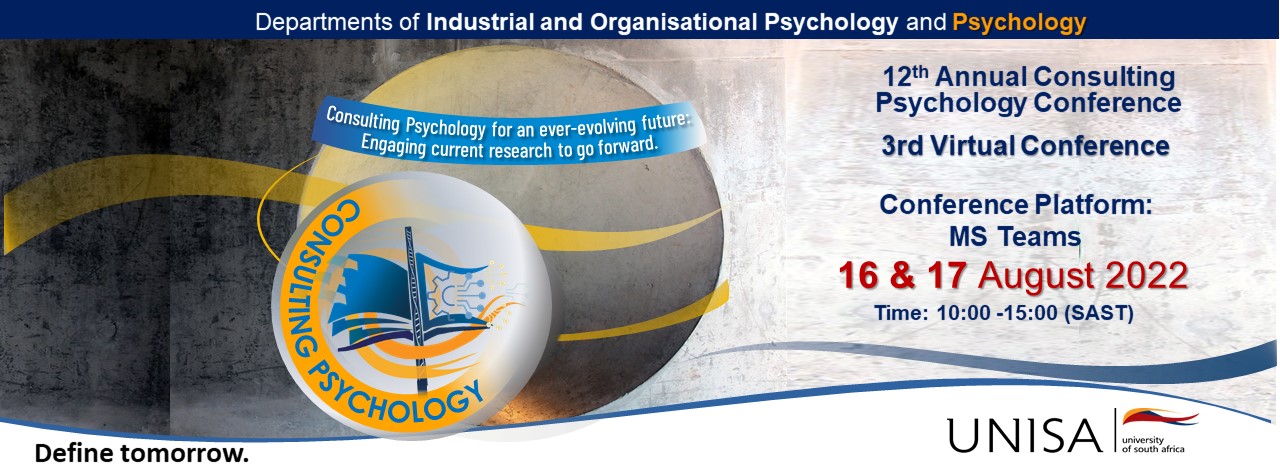
Unisa's Departments of Psychology and Industrial and Organisational Psychology, in association with the 2022 Doctoral Students in Consulting Psychology, are proud to host the 12th Annual and THIRD VIRTUAL Consulting Psychology Conference in South Africa.
The conference will take place on 16 and 17 August 2022 on Microsoft Teams Platform (the link for joining to be send 15 August in the afternoon)
Consulting Psychology in South Africa
Consulting psychology is a specialised area of psychology with the aim of applying and extending psychologists’ expert knowledge through the process of consultation to problems involving human behaviour. The practice of consulting psychology is guided by the science of psychology in evaluating the effectiveness of interventions and assessment methodologies. Consulting psychologists should have in-depth knowledge of the main theoretical models in psychology and of their particular methodologies and applications as they apply to individual, group and organisational consulting domains. The Department of Industrial and Organisational Psychology and the Department of Psychology at Unisa offer a specialised PhD degree in Consulting Psychology. For more information on this PhD degree, please contact Mabel Campher at 012 429 8003 or camphm@unisa.ac.za.
Applying for CPD points
Disclaimer
Presenters and attendees of all CPD activities should please note that the attainment of continuing education units (CEUs) does not license any professional to practice outside their official scope of practice. CEUs are intended to broaden the knowledge of professionals but do not constitute professional training.
2022 Conference Theme
Consulting Psychology for an ever-evolving future: engaging current research to go forward
Change is indeed the only constant! It is safe to say that the volatile, uncertain, complex and ambiguous context of the disruptive 21st century is here to stay. As the world emerges from one of the most unsettling global pandemics, together with fast-paced technology changes, it is clear that this context calls for individuals, teams, organisations, and societies to take pause and consider how to remain relevant, agile and resilient in an ever-evolving context and future. This is no different for consulting psychology.
It is against this backdrop that we shift focus and ask what is the contribution of consulting psychology in an ever-evolving context? How does the discipline reposition and embrace the advances in technology to keep on moving forward? How does its research focus create its future and optimise the value add to individuals, teams and organisations? With this purpose in mind, we engage with current research and subject relevant experts to address some of these pertinent issues.
We invite you to join us for this all-important conversation.
2022 Conference Programme (DAY 1 - 16 August)
|
TIME |
TOPIC |
PRESENTERS |
|
09:30 – 10:00 |
Log-on and Sorting out of technical problems |
|
|
10:00 – 10:20 |
Opening and Welcome |
Programme Director: |
|
10:20 – 10:45 |
Opening Statement |
|
|
10:45 – 11:30 |
Presentation 1 |
Dr Henk Struwig |
|
11:30 – 11:45 |
Short music item |
|
|
11:45 – 12:30 |
Presentation 2 |
Dr Solani Bvuma |
|
12:30 – 12:35 |
Stretch |
|
|
12:35 – 13:20 |
Presentation 3 |
Dr Tracy Potgieter |
|
13:20 – 13:55 |
Lunch |
|
|
13:55 – 14:35
|
ART-Visual representation of the conference thus far |
Dr Inette Taylor |
|
14:35 – 15:00 |
Closure of Day 1 |
Prof van Deventer |
2022 Conference Programme (DAY 2 – 17 August)
|
TIME |
TOPIC |
PRESENTERS |
|
09:15 – 09:30 |
Log-on and Sorting out of technical problems |
|
|
09:30 – 10:15 |
Presentation 4 |
Dr Marius Pretorius |
|
10:20 – 11:45 |
Engagement Café Format: Break Away rooms |
Facilitated by: PhD Consulting Psychology Students (2022) and interns |
|
11:45 – 11:50 |
Short music item |
|
|
11:50 – 12:35 |
Presentation 5 |
Dr Madri Janse van Rensburg |
|
12:35 – 13:00 |
Lunch |
|
|
13:00 – 13:30 |
ART-Visual representation of the conference |
Dr Inette Taylor |
|
13:30 – 13:35 |
Stretch (5 minutes) |
|
|
13:35 – 15:00 |
Keynote address: Respondent |
Prof Skorburg Respondent (20 minutes) |
|
15:00 – 15:15 |
Closure Word of Thanks |
Ms Fredelene Elie Prof M S May |
2022 Keynote Speaker’s profile
Keynote Address Day 2 (17August 2022)

Professor Joshua August (Gus) Skorburg (University of Guelph, Canada)
Prof Gus Skorburg holds a PhD in Philosophy from the University of Oregon. He is currently Assistant Professor of Philosophy and Co-Academic Director of the Centre for Advancing Responsible and Ethical Artificial Intelligence (CARE-AI), and also a Faculty Affiliate at the One Health Institute.
In general, he works on a wide range of topics in applied ethics and moral psychology. Much of his published work has explored the philosophical implications of our interdependence with other agents and with information technology.
At present, he is working on several projects involving the ethical, legal, and social implications of data science, artificial intelligence, and machine learning. More specifically, he is interested in how these technologies have given rise to new methods (such as mHealth, digital phenotyping, computational psychiatry, computational social science, etc.) which may or may not fit into existing ethical and epistemological frameworks.
He authored and co-authored 18 journal articles and 10 book chapters and talked extensively on ethics in the behavioural and cognitive sciences.
Keynote Address: Ethical and epistemic issues in digital (mental) health
Well before the COVID-19 pandemic, proponents of digital mental health were touting the promise of various digital tools and techniques to revolutionize mental healthcare. As social distancing and its knock-on effects strained existing mental health infrastructures, calls have grown louder for implementing various digital mental health solutions at scale. For example, Hillary Schieve, the mayor of Reno, NV, USA, proposed spending $1.3 million of expiring coronavirus relief funding on virtual therapy for residents through the app Talkspace. There is thus an urgent need to critically examine the hype surrounding digital mental health. In this talk, I introduce four different ethical and epistemic gaps that need to be addressed: The evidence gap, the inequality gap, the prediction-intervention gap, and the safety gap. Consideration of these gaps, I contend, ought to temper enthusiasm about the promises of digital mental health. I conclude with some suggestions about how my analysis might apply to digital health initiatives more generally.
2022 Speakers’ profiles
|
Name and Surname |
Job Title |
Organisation |
Registration |
LinkedIn Profiles |
|
Dr Solani Bvuma (PhD Consulting Psychology, UNISA) |
CEO |
S-Group Consulting Engineers |
Clinical Psychologist |
|
|
Dr Madri Jansen van Rensburg (PhD Consulting Psychology, UNISA) |
Director
|
Resilience Analysis Consulting CC |
Research Psychologist |
https://za.linkedin.com/in/madrijvr
|
|
Dr Tracy Potgieter (PhD Consulting Psychology, UNISA) |
Group Head: Organisational Effectiveness |
Coca-Cola Beverages Africa |
Industrial Psychologist |
https://za.linkedin.com/in/dr-tracy-potgieter-6298a06
|
|
Dr Marius Pretorius (PhD Consulting Psychology, UNISA) |
Managing Director and Founder |
TDCI |
Industrial Psychologist |
|
|
Dr Henk Struwig (PhD Consulting Psychology, UNISA) |
Head of Organisational Development |
Investec |
Industrial Psychologist |
|
|
Dr Inette Taylor |
Artist for the conference |
Private Practice |
Clinical Psychologist |
|
Facilitators: Breakaway Sessions
To be facilitated by the 2022 Consulting Psychology Doctoral students and two interns of the programme.
Date and venue
- Tuesday, 16 August 2022, 10:00 - 15:00
- Wednesday, 17 August 2022, 09:15 - 15:15
To be presented on the Microsoft Teams virtual platform, the link for joining will be send to participants on 15 August 2022.
Registration and Fees
Registration due date
Click here to register. Please register by 12:00 on 15 August 2022
Registration fees
R650.00 per person
Send proof of payment to singhmb@unisa.ac.za
Bursaries
Bursaries are available. Bursaries will be awarded to deserving candidates. Please contact Bahia Singh (singhmb@unisa.ac.za)
Banking Details
|
Bank |
First National Bank |
|
Branch |
Sunnyside |
|
Account number |
62799625200 |
|
Branch code |
250645 |
|
Swift code |
FIRNZAJJXXX |
|
Account holder |
University of South Africa – income |
|
Reference |
830600Surname & Initial |
Send proof of payment to: singhmb@unisa.ac.za